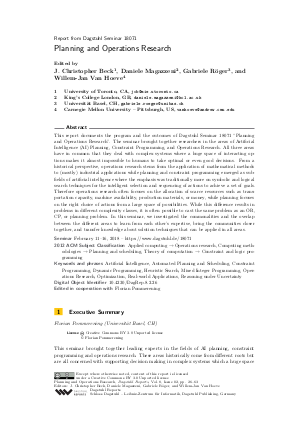Planning and Operations Research (Dagstuhl Seminar 18071)
Authors J. Christopher Beck, Daniele Magazzeni, Gabriele Röger, Willem-Jan Van Hoeve and all authors of the abstracts in this report
-
Part of:
Issue:
Dagstuhl Reports, Volume 8, Issue 2
Part of: Volume: Dagstuhl Reports, Volume 8
Part of: Journal: Dagstuhl Reports (DagRep) - License:
 Creative Commons Attribution 3.0 Unported license
Creative Commons Attribution 3.0 Unported license
- Publication Date: 2018-07-20
File

PDF
DagRep.8.2.26.pdf
- Filesize: 9.43 MB
- 38 pages
Document Identifiers
Subject Classification
Keywords
- Artificial Intelligence
- Automated Planning and Scheduling
- Constraint Programming
- Dynamic Programming
- Heuristic Search
- Mixed Integer Programming
- Operations Research
- Optimization
- Real-world Applications
- Reasoning under Uncertainty
Metrics
- Access Statistics
-
Total Accesses (updated on a weekly basis)
0Document
0Metadata
Abstract
This report documents the program and the outcomes of Dagstuhl Seminar 18071 "Planning and Operations Research". The seminar brought together researchers in the areas of Artificial Intelligence (AI) Planning, Constraint Programming, and Operations Research. All three areas have in common that they deal with complex systems where a huge space of interacting options makes it almost impossible to humans to take optimal or even good decisions. From a historical perspective, operations research stems from the application of mathematical methods to (mostly) industrial applications while planning and constraint programming emerged as subfields of artificial intelligence where the emphasis was traditionally more on symbolic and logical search techniques for the intelligent selection and sequencing of actions to achieve a set of goals. Therefore operations research often focuses on the allocation of scarce resources such as transportation capacity, machine availability, production materials, or money, while planning focuses on the right choice of actions from a large space of possibilities. While this difference results in problems in different complexity classes, it is often possible to cast the same problem as an OR, CP, or planning problem. In this seminar, we investigated the commonalities and the overlap between the different areas to learn from each other's expertise, bring the communities closer together, and transfer knowledge about solution techniques that can be applied in all areas.
Cite As Get BibTex
J. Christopher Beck, Daniele Magazzeni, Gabriele Röger, and Willem-Jan Van Hoeve. Planning and Operations Research (Dagstuhl Seminar 18071). In Dagstuhl Reports, Volume 8, Issue 2, pp. 26-63, Schloss Dagstuhl – Leibniz-Zentrum für Informatik (2018)
https://doi.org/10.4230/DagRep.8.2.26
BibTex
@Article{beck_et_al:DagRep.8.2.26,
author = {Beck, J. Christopher and Magazzeni, Daniele and R\"{o}ger, Gabriele and Van Hoeve, Willem-Jan},
title = {{Planning and Operations Research (Dagstuhl Seminar 18071)}},
pages = {26--63},
journal = {Dagstuhl Reports},
ISSN = {2192-5283},
year = {2018},
volume = {8},
number = {2},
editor = {Beck, J. Christopher and Magazzeni, Daniele and R\"{o}ger, Gabriele and Van Hoeve, Willem-Jan},
publisher = {Schloss Dagstuhl -- Leibniz-Zentrum f{\"u}r Informatik},
address = {Dagstuhl, Germany},
URL = {https://drops.dagstuhl.de/entities/document/10.4230/DagRep.8.2.26},
URN = {urn:nbn:de:0030-drops-92894},
doi = {10.4230/DagRep.8.2.26},
annote = {Keywords: Artificial Intelligence, Automated Planning and Scheduling, Constraint Programming, Dynamic Programming, Heuristic Search, Mixed Integer Programming, Operations Research, Optimization, Real-world Applications, Reasoning under Uncertainty}
}
